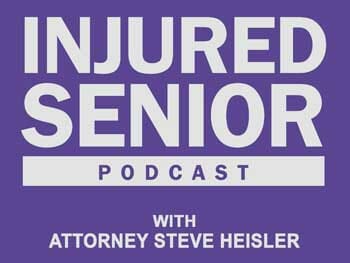
In this episode, Steve and Paul discuss:
1. How did you go from an attorney in England to a district attorney in San Diego?
- I came to the US in 1970 after seeing Easy Rider, traveled the country, met a girl and fell in love.
2. How did you come to specialize in elder abuse prosecution?
- One day the San Diego D.A. says “Adult Protective Services tells me we have an elder abuse problem” and I didn’t even know what that was at the time, so he made me the head of Elder Abuse Prosecution and I learned from there.
3. Why was it that nobody knew about this problem?
- It’s the same parallel that we had with domestic violence about 40 years ago, nobody wanted to talk about it because it was a private family affair, yet look at how far we’ve come. Now, recognizing domestic violence.
4. What are the various forms of elder abuse?
- There is no uniform definition of elder abuse because in fact, some states don’t even recognize as a category. When I use the term elder abuse. I’m actually also encompassing what I would also call dependent adults, people with disabilities, people with physical or mental challenges who could be of any age because the same elements of the crime apply to that category as much as it does older adults. It covers physical abuse, slapping, hitting, pushing, homicides, sexual assaults, fear, mental abuse, neglect, and financial exploitation. Even though you can’t photograph the injuries of mental abuse there, they’re out there.
5. Is there one particular form of elder abuse that you saw as a district attorney that is more prevalent?
- Physical abuse by a son. He’s typically aged between 35 and 55, he lives at home with his widowed mother and he is in every pretty much every single case. I’ve prosecuted. He’s lazy, unemployed, and often has an addiction and/or a gambling problem.
6. Did you find the same thing with the mother whose son was abusing her but just didn’t want to speak out because she might have been scared or ashamed?
- Yes, and often they would not want to prosecute to try to protect their son. Sometimes I would have to go out on a limb and say “I am going to prosecute your son whether you want me to or not because your son has an addiction” then we would pursue the case with or without the victim’s blessing, but sometimes it was challenging.
7. On the financial abuse is it mostly stealing or is it a little more sophisticated?
- The son, the grandson, the granddaughter, the nephew or the niece who’s down on their luck or who’s addicted, they will use any method they can to steal from the elderly person in the home. You’ve got the paid caregiver coming in from an outside agency, they come into the house, and they see an easy opportunity to steal from the vulnerable elderly person. The third type of category is the rogue tradesperson, the plumber, the electrician, the roofer who sees a golden opportunity to overcharge to upsell to to convince the elderly person that the house is about to collapse and they need all these repairs done on the house. You’ve then got the internet scammer, you’ve got the romance scammer who pretends to be somebody who’s fallen in love with the elderly widow or divorcee, the sweepstakes scammer, the IRS scam and many others.
8. The Coronavirus is such a tragic situation but I’m sure a lot of scammers that can really take advantage of vulnerable people like elderly right now?
- They really do, using the stimulus check as an opportunity to send emails to make phone calls pretending to be from the government, or we need this information before we can send out your money. So you get a call, as a say, a 75 year old who’s been using the internet and you get a call saying, Oh, this is Microsoft. There’s something that there’s a virus on your computer, we need to fix it. And then they get remote control of your computer. And then they download all your banking information. And from that, I mean, this is happening every single day.
9. What are some of the ways, in your opinion, to reduce the risk of becoming a victim of elder abuse?
- We need to stay in touch with an aging parent. I can’t tell you how many times I would get a call at my office, from an angry child of an aging parent, “I’ve just discovered that my 86 year old mother has been ripped off by her caregiver and I want you to prosecute to the max” and when I find out it’s been going on for a long time, I would hear every excuse as to why they had not been involved in their parent’s life during that time.
10. {See the quote below regarding contacting your parent’s bank}- Do banks step up and actually pay attention, and do you have a template letter for this?
- California passed a law several years ago requiring every bank teller to be a mandated reporter of suspected elder financial abuse. That is a powerful weapon to remind the bank in the letter. Find out in the state where your parents reside if the financial institution is mandated to report suspected financial elder abuse.
There’s a lot of older adults who are very loyal to their place of worship, and if you’ve got parishioners who’ve sat in the same Pew for the last 40 years and you see that that person is no longer attending your services, that should create a red flag, because one of the first indicators of elder abuse is that the perpetrator will make sure that the older adult stops doing their regular socializing. It takes the whole community to be part of this- banks, clergy, doctors, nurses, CPAs, elder law attorneys, civil attorneys, mail carriers, Meals on Wheels, we all need to be on the lookout for any sign that an older person is not showing the same kind of consistency that they showed in the past.
“Many older families have to have a caregiver come in to the home and I have this conversation with adult children. Write a letter to your parent’s bank branch. And it’s got to be a letter, not a phone call, not an email, a letter, good old fashioned letter and say, dear sir, or Madam, I understand that my parents have been with your bank for the last 55 years. They are loyal customers. I want you to be loyal to them. I want you to keep a special eye on my parents’ account because things have changed over the last few weeks. My parents now have a caregiver coming into the house. I want you to scrutinize their accounts. I know you’re not going to tell me because it’s confidential. But if you see a fluctuation in any pattern of their normal financial behavior, I want you to pay special attention to that. And the moment you suspect that somebody is taking advantage of my parents’ accounts, I want you to call the local Adult Protective Services and make them aware’ and I think if more people did that letter, we could stop a lot of financial exploitation of older adults within the first week of a suspicious withdrawal from an ATM machine. ” — Paul Greenwood
To find out more about the National Injured Senior Law Center or to set up a free consultation go to https://www.injuredseniorhotline.com/ or call 855-622-6530
Connect with Paul Greenwood:
Twitter: https://twitter.com/SDDistAtty?fbclid=IwAR1HaCFltvefnjjnAz2iKHF12g8QVqMcx31mn4d-H-jNsnpSzKk-dEnJ4EA
Facebook: https://www.facebook.com/SanDiegoCountyDistrictAttorney/posts/deputy-district-attorney-paul-greenwood-is-featured-in-this-kqed-radio-story-abo/472803159479287/
Instagram: https://www.instagram.com/sddistatty/?fbclid=IwAR3wiE_K_UzcW0YS5FANas7BHrfJrKxBMz1HqqGb7VuQEJ7ALVt9iHYMWxY
Website: https://www.sdcda.org/
YouTube: https://www.youtube.com/user/sandiegoda?fbclid=IwAR01_CjT93XWWgrX8MbcEz3dkqLmZyWcij06y1ahpNzp1YGQZsHPsE8Ay4s
LinkedIn: https://www.linkedin.com/in/paul-greenwood-14841a5/
Email: pgreendda@gmail.com
CONNECT WITH STEVE H. HEISLER:
Website: http://www.injuredseniorhotline.com
Facebook: https://www.facebook.com/attorneysteveheisler/
LinkedIn: https://www.linkedin.com/company/the-law-offices-of-steven-h.-heisler/about/ Email: info@injuredseniorhotline.com
Audio production by Turnkey Podcast Productions. You’re the expert. Your podcast will prove it.
